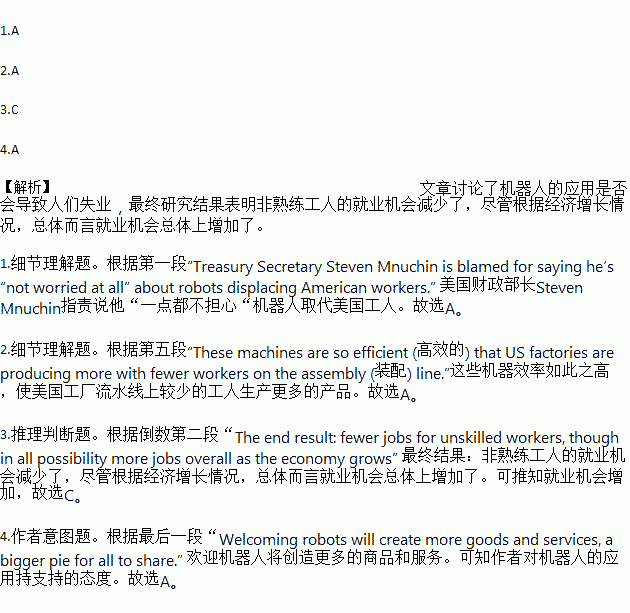题目内容
Will Robots Put Us All on the Unemployment Line?
Treasury Secretary Steven Mnuchin is blamed for saying he’s “not worried at all” about robots displacing American workers. Yet he’s spot on: Robots will soon launch a productivity boom, leading to improved economic growth, higher wages and a higher standard of living. Just what America needs after a decade dragging along at 2 percent growth.
Scaremongers (危言耸听者) who warn that robots steal jobs are failing to predict the jobs of the future. A hotel worker who makes room-service deliveries today may instead be monitoring or repairing delivery robots. Not to mention the new jobs in every field that will come with a booming economy, predict PricewaterhouseCoopers consultants. Robots are our friends.
And there’s no going back^ contrary to the view of Bill Gates. The tech billionaire wants to put the brakes on the next innovation boom. He’s suggesting a heavy tax to punish robots in the workplace. Complete foolishness.
Economists have been complaining about the poor world economy, declaring what’s needed is a technological breakthrough. Well, here it is — assuming politicians don’t try to kill it.
Robotics has already taken hold in manufacturing, especially the auto industry. These machines are so efficient (高效的) that US factories are producing more with fewer workers on the assembly (装配) line. That gain in productivity translates into higher wages for the remaining factory workers and lower prices for consumers.
If President Trump succeeds in bringing auto jobs back to the United States, they won’t be the same routine, repeated tasks that assembly line workers had in the past. These new jobs will require knowledge of computer-aided design and other complex engineering issues.
The same goes for the service field, like supermarket and warehousing. A surprising 94 percent of CEOs using robots say they’ve increased productivity. The end result: fewer jobs for unskilled workers, though in all possibility more jobs overall as the economy grows, according to PricewaterhouseCoopers. Message to politicians: Focus on workplace readiness. It beats trying to block technological progress—a vain attempt to protect yesterday’s jobs.
The economy booms when businesses, not politicians, call the shots on technology. Welcoming robots will create more goods and services, a bigger pie for all to share. Skills training will help everyone get a piece of the pie.
1.Who may agree that robots won’t put us all on the unemployment line?
A. Steven Mnuchin. B. Scaremongers.
C. Bill Gates. D. Politicians.
2.Why are robots widely used in manufacturing?
A. They are productive. B. They are our friends.
C. Workers will earn more money. D. Workers can’t do skilled tasks.
3.What does PricewaterhouseCooper indicate?
A. More workers will lose their jobs.
B. Everybody should be retrained to gain new skills.
C. More jobs will be created due to the growth of economy.
D. High productivity leads to higher wages for all people.
4.What’s the author’s attitude towards the application of robots?
A. Supportive. B. Respectful.
C. Doubtful. D. Negative.
 鸿图图书寒假作业假期作业吉林大学出版社系列答案
鸿图图书寒假作业假期作业吉林大学出版社系列答案
